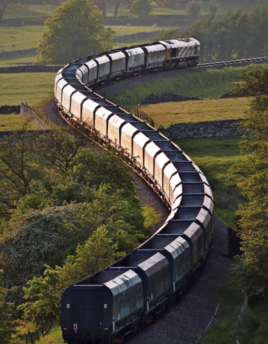Removing diesel-only trains from the network by 2040. Yes, even freight trains. With net zero greenhouse gas emissions achieved by 2050. These are headline acts in the Transport Decarbonisation Plan.
They seem a long way in the future, especially with the sale of new purely petrol and diesel cars banned less than nine years from now.
“Electrification is the big-ticket item. Good benefits and early realisation from mature technologies,” says Rod Anderson, Rail Research Co-ordinator at the University of Southampton.
“That’s a relief. Hydrogen and batteries get all the press, and they have their place, but the grown-ups seem to be focused on electrification.”
But he warns: “Don’t emit limitless carbon in order to reduce traction carbon. There is no point busting your entire carbon budget building the infrastructure if you then need decades of traction savings to recover it. Carbon is a bit like compound interest: if you burn it early, the costs are harder to claw back.”
David Clarke, Technical Director at the Railway Industry Association, adds: “Our mantra is to get a rolling programme of electrification started now. Something like 300 miles of overhead line equipment would get 80% of freight under the wire. That is the obvious quick win.”
The Transport Decarbonisation Plan is a 220-page blueprint covering all transport modes. According to Secretary of State for Transport Grant Shapps, it is “the first in the world”. The nine supporting documents include a rail environment policy statement.
Shapps also said: “It is not about stopping people doing things, it’s about doing the same things differently. We will still fly on holiday.”
Despite what Shapps said, most commentators agree that meeting the targets will involve travelling less - especially by air and road. Politically, decarbonising is a hard sell: transport is the largest contributor to UK greenhouse gas emissions. But for the emerging Great British Railways, this is a significant opportunity.
Rail Delivery Group Director General Andy Bagnall says: “The Government should use a polluter-pays approach when considering taxation, such as air passenger duty.”
The big news for freight in the decarbonisation strategy was that the ban on new petrol and diesel cars is being extended to all heavy goods vehicles by 2040.
Because no alternative zero-emission propulsion for large lorries currently exists, there is a commitment to increase the modal share of rail freight, which is also diesel-hauled, but for which the alternative of low-carbon power already exists.
But the reports and strategies collectively avoid the elephants in the room. A £27 billion roads programme continues. But apart from the already-started HS2 and East West Rail, large-scale rail enhancements do not.
And while fuel duty for cars has remained the same for a decade, public transport fares have increased significantly. What will the Government do as fuel duty revenues plunge and electric vehicles take over? Will there be distance-based road user charging?
Clearly the road to zero-emission transport contains many uncertainties.














